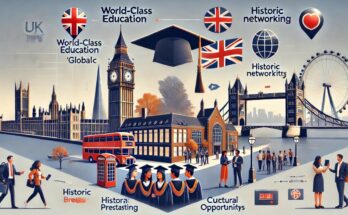Top UK Universities Shaping The United Kingdom has long been a global leader in higher education, with a rich history of producing influential thinkers, innovators, and statespeople. Its universities combine academic rigor, innovative teaching, and extensive networks to prepare students for leadership roles in a rapidly changing world. From fostering critical thinking to providing real-world experience, institutions like Oxford, Cambridge, and Imperial College London stand out for their ability to shape future leaders across fields such as politics, business, technology, and social impact. Drawing on recent rankings and insights, this article explores the top UK universities that are cultivating the leaders of tomorrow, highlighting their unique strengths, programs, and contributions to global leadership.
University of Oxford
Overview
Founded in 1096, the University of Oxford is the oldest university in the English-speaking world and holds the top spot in the Times Higher Education World University Rankings 2025 for the ninth consecutive year. With 36 colleges and a global reputation for excellence, Oxford educates approximately 24,000 students, including 45% international students from over 160 countries.
Leadership Development
Oxford’s tutorial system, involving one-on-one or small-group sessions with world-class faculty, fosters critical thinking, intellectual curiosity, and persuasive communication—core leadership skills. Its diverse programs in humanities, social sciences, and business, particularly at the Saïd Business School, emphasize ethical leadership and global perspectives. The school’s Master’s in Global Governance and Diplomacy trains students to navigate complex international challenges, producing graduates like Finland’s president, Alexander Stubb, who earned a PhD at LSE but credits Oxford’s influence through its global alumni network.
Oxford’s extensive alumni network, including 36 heads of state since 1990, offers unparalleled mentorship opportunities. Programs like the Oxford Union, a renowned debating society, hone public speaking and leadership skills, preparing students for roles in government, NGOs, and industry. The university’s focus on interdisciplinary learning and research, supported by initiatives like the Oxford Martin School, equips students to address global issues such as climate change and AI ethics.
Why It Shapes Leaders
Oxford’s blend of academic excellence, personalized teaching, and global networks produces leaders who excel in diverse fields. Its graduates, including 121 Nobel Laureates and 47 world leaders, demonstrate its impact on shaping statespeople and innovators. The university’s emphasis on responsible leadership ensures students are ready to tackle tomorrow’s challenges with integrity and vision.
University of Cambridge
Overview
Established in 1209, the University of Cambridge is the world’s third-oldest surviving university, consistently ranked among the top five globally (QS 2025). With 31 colleges and 29,000 students, including a diverse international cohort, Cambridge excels in research, innovation, and interdisciplinary education.
Leadership Development
Cambridge’s collegiate system fosters a close-knit community where students develop leadership through collaboration and mentorship. Its programs in sciences, humanities, and business, such as the MBA at Judge Business School, emphasize innovation and strategic thinking. The university’s focus on interdisciplinary learning, exemplified by institutes like the Cambridge Centre for AI in Medicine, prepares students to lead in tech-driven and societal roles.
Cambridge’s global influence is evident in its alumni, including 121 Nobel Laureates, 47 heads of state, and notable figures like Charles Darwin and Stephen Hawking. The Cambridge Union and student-led initiatives like the Wilberforce Society provide platforms for debate and policy development, cultivating skills for leadership in politics and beyond. Industry partnerships with firms like AstraZeneca enhance practical training, while programs like the Manchester Leadership Programme combine volunteer work with coursework to build socially responsible leaders.
Why It Shapes Leaders
Cambridge’s rigorous academics, combined with its emphasis on critical thinking and global collaboration, produce versatile leaders. Its alumni network and research opportunities ensure graduates are equipped to drive innovation and influence in fields ranging from science to governance.
Imperial College London
Overview
Founded in 1907, Imperial College London is a global leader in science, engineering, medicine, and business, ranked second worldwide in the QS World University Rankings 2025. With 17,000 students, including a large international cohort, Imperial is known for its research impact and industry connections.
Leadership Development
Imperial’s focus on STEM disciplines, combined with its Business School, produces leaders in technology and entrepreneurship. Programs like the Master’s in Innovation, Entrepreneurship, and Management teach students to navigate global markets, while research centers like the Data Science Institute train students in cutting-edge fields like AI. Imperial’s collaboration with industry leaders, such as Pfizer and Rolls-Royce, provides hands-on experience, preparing students for leadership in tech-driven industries.
The university’s emphasis on practical application, exemplified by its ranking as the UK’s top research institution in the Research Excellence Framework, ensures graduates can translate knowledge into real-world solutions. Student-led initiatives, like the Imperial College AI Hackathon, foster innovation and teamwork, while the Enterprise Lab supports student startups, producing leaders in tech entrepreneurship.
Why It Shapes Leaders
Imperial’s focus on innovation and industry partnerships equips students to lead in high-impact fields. Its graduates, including pioneers in medicine and technology, demonstrate its role in shaping leaders who address global challenges like healthcare and sustainability.
London School of Economics and Political Science (LSE)

Overview
Founded in 1895, LSE is a world leader in social sciences, ranked first in the UK for social sciences in the Times and Sunday Times Good University Guide 2025. With 11,000 students, 60% of whom are international, LSE is a hub for aspiring leaders in economics, politics, and finance.
Leadership Development
LSE’s programs, such as the BSc in Economics and MSc in International Relations, emphasize analytical skills and global perspectives, preparing students for roles in policy, finance, and diplomacy. Its faculty, including Nobel Laureates like Amartya Sen, provide mentorship, while the LSE Student Union and debating societies hone leadership and advocacy skills. Alumni like Finland’s president Alexander Stubb (PhD in international politics) highlight LSE’s influence on global leadership.
LSE’s location in London, a global financial hub, offers networking opportunities with firms like Goldman Sachs and the UN. Its careers service connects students with internships and jobs, with 92.5% of graduates in high-level roles or postgraduate study (Times 2025). Programs like the Global Master’s in Management integrate real-world case studies, fostering strategic thinking for corporate leadership.
Why It Shapes Leaders
LSE’s focus on social sciences, combined with its global outlook and London location, produces leaders in governance, finance, and policy. Its diverse student body and alumni network ensure graduates are equipped for influential roles worldwide.
University College London (UCL)
Overview
Founded in 1826, UCL is a multidisciplinary university in London, ranked among the top 10 globally (QS 2025). With 40,000 students, including many international students, UCL excels in medicine, law, and social sciences, producing leaders like the founders of modern India and Nigeria.
Leadership Development
UCL’s programs, such as the MSc in Global Healthcare Leadership, emphasize interdisciplinary skills and ethical decision-making. Its research centers, like the UCL Institute of Health Informatics, drive innovation in healthcare, preparing students to lead in global health systems. UCL’s careers service offers tailored support, including internships with organizations like the WHO, while student societies like the UCL Diplomacy Society develop leadership through policy simulations.
UCL’s global alumni network, including 34 Nobel Laureates, provides mentorship and connections. Its location in Bloomsbury, near London’s cultural and professional hubs, enhances networking opportunities. UCL’s emphasis on diversity and inclusion ensures students develop cultural competence, critical for global leadership.
Why It Shapes Leaders
UCL’s multidisciplinary approach, combined with its research excellence and global networks, produces adaptable leaders. Its graduates excel in fields like healthcare, law, and technology, driving impact on a global scale.
The UK’s Role in Shaping Global Leaders
The UK’s universities benefit from a rich academic tradition, world-class faculty, and a multicultural environment, with 14%



